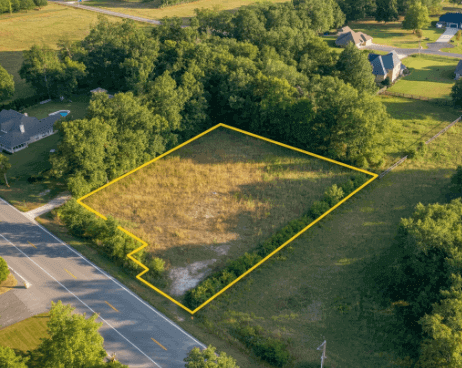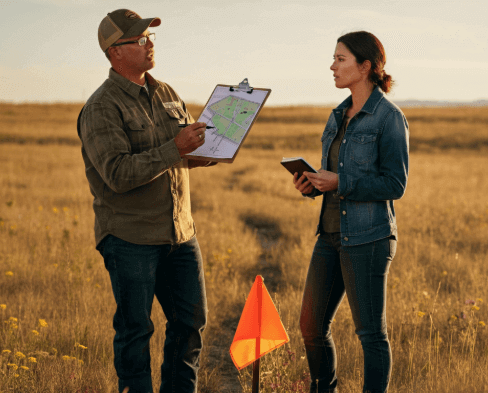Owning a property with no direct road access can feel like a dead end, leaving many landowners wondering, “Is it legal to sell landlocked property?” The answer is yes, and it is a more common situation than many realize, with a significant number of rural parcels lacking formally recorded access, often leading to title complications. Selling is entirely possible, but it requires a clear understanding of your rights, disclosure obligations, and potential solutions, such as negotiating an easement with a neighbor. You can explore options such as creating an easement by necessity, proving a prescriptive easement through historical use, or simply selling the property as-is to the right buyer. For sellers seeking a fast and straightforward solution, Steve Daria and Joleigh, renowned real estate investors and cash land buyers, specialize in these complex situations. They possess the expertise to navigate title challenges and can provide a fair cash offer without the lengthy delays associated with securing legal access. So, is it legal to sell landlocked property? Absolutely, and we can help you understand its true value and your best path forward. To review your access options and get a no-obligation cash offer, book a free discussion with our team today.
What does “landlocked property” mean?
A landlocked property is a piece of land that has no legal access to a public road, which means you must cross over another person’s private land to reach it.
This isn’t just about having a physical path; it’s about having a legally recorded right-of-way, as informal permission from a neighbor can be revoked at any time.
Properties often become landlocked due to old subdivisions that were created without formal easements, mapping errors, or changes to public road layouts over the years.

This lack of legal access significantly affects the property’s value, makes it difficult to get financing or insurance, and can complicate the closing process.
Many owners facing this challenge ask, “Is it legal to sell landlocked property?”, and the answer is yes, but the access issue must be addressed.
Common solutions include negotiating a private easement with a neighbor, seeking an easement by necessity through the courts, or establishing a prescriptive easement based on long-term, uninterrupted use.
Another practical option is selling directly to a buyer who is willing to take on the challenge of resolving the access themselves.
To fully understand your situation, it is wise to order a professional title search and consult with a real estate expert who can explain your best options.
Get Started: Get Your Cash Offer Below…
We are direct land buyers. There are no commissions or fees and no obligation whatsoever. Start below by sharing where your property is and where we can send your offer…
Is it legal to sell landlocked property?
Yes, it is perfectly legal to sell a landlocked property, but sellers must be transparent about the lack of formal, recorded access.
This condition significantly impacts the property’s price, the buyer’s ability to secure financing, and the overall closing process.
While traditional lenders often refuse to finance properties without legal access, cash buyers are frequently willing to purchase them as-is.
The key question for sellers isn’t just, “Is it legal to sell landlocked property?” but rather how to navigate the sale effectively.
Common solutions include negotiating a recorded easement with a neighbor, pursuing a court-ordered easement by necessity, or selling to a buyer prepared to handle the access issue themselves.
A professional title search and survey are essential to confirm the property’s status and to understand the local rules that govern the process.
Keep in mind that neighbor negotiations or easement disputes can add time and expense to the transaction, so using an experienced title company is crucial.
Ultimately, sellers should gather all their documents and review their options to choose the path that best fits their timeline and financial goals.
How does being landlocked affect my property’s value?
- Reduced Marketability and Buyer Pool: A landlocked property attracts a significantly smaller pool of potential buyers, as most people require financing and guaranteed road access. This limited demand directly reduces its marketability, making it more challenging to sell through traditional channels, such as the MLS.
- Challenges with Appraisals and Financing: Lenders are very hesitant to approve mortgages for properties without legal, recorded access, which means most appraisals will come in very low or fail altogether. This financing barrier effectively limits your potential buyers to those who can pay with cash.
- Factoring in Costs to Secure Access: The potential cost and time required to negotiate or legally secure an easement are factored into the property’s value, resulting in a significant discount. Since the answer to “Is it legal to sell landlocked property?” is yes, buyers will calculate their offer based on the risk and expense of solving the access problem.
- Significant Price Discounts: Compared to a similar parcel with clear road access, a landlocked property typically sells at a substantial discount, which can range from 30% to 60% or even more. The final price depends on specific circumstances, including the likelihood of obtaining an easement and the seller’s motivation.
- Attraction to Niche Buyers: The most likely buyers are adjacent neighbors looking to expand their land or specialized cash investors who buy properties with title issues. These buyers understand the risks and will offer a lower price that reflects the property’s limited use and the cost of resolving its access problems.

Who would buy a landlocked property?
A specific group of buyers is often interested in landlocked properties, with each individual having distinct reasons and strategies.
The most common buyers are adjacent neighbors, seeking to expand their own land, gain privacy, or prevent unwanted development near their homes.
Specialized real estate investors and cash buyers are also active in this market; these buyers have experience with complex titles and are skilled at resolving difficult access issues.
They frequently buy at a reduced price, take on the challenge of securing a legal easement, and aim to resell at a profit once access is established.
Additionally, recreational buyers, such as hunters or campers, may be interested, particularly if informal access is available or can be arranged with a neighbor.
Conservation groups sometimes purchase these parcels for preservation or to protect habitats.
Since the answer to “Is it legal to sell landlocked property?” is yes, these niche buyers are willing to step in, though they will expect a discount for the added risk.
Traditional homebuyers and lenders generally avoid such land due to financing difficulties.
For a smooth process, assemble your documents and consult a knowledgeable real estate professional before listing your property for sale.
What are the risks of selling landlocked property without resolving access issues?
- Lower Offers and Price Reductions: Buyers often lower their offers to cover the risk and cost of getting legal access. Some may request a discount or cancel the deal entirely if the title search reveals no access.
- Buyer Financing and Insurance Issues: Most buyers cannot obtain a mortgage without legal access, so only cash buyers or investors are typically interested. This limits your pool of buyers and can slow down the selling process.
- Potential for Legal Disputes: Failing to disclose access issues fully could lead to the buyer suing you after the sale. While the answer to “Is it legal to sell landlocked property?” is yes, hiding facts can lead to legal trouble.
- Lengthy Closing Delays and Higher Costs: Discovering access problems during closing can delay the sale while you work out agreements. These delays often result in higher legal fees and additional closing costs.
- Damage to Your Reputation: Selling a property with undisclosed access issues can harm your reputation, especially when these problems occur repeatedly. Word travels fast, and it may make future real estate deals harder.
How long does it typically take to sell a landlocked property once access issues are resolved?
Once legal access is officially recorded, the timeline for selling a formerly landlocked property often mirrors that of a standard land sale.
A clean transaction can close quickly, typically within two to four weeks with a cash buyer or 30 to 60 days for a financed purchase.
The speed depends heavily on having a clear title, an updated survey, and a properly filed easement, as these documents satisfy the lender’s and title company’s requirements.
Any lingering disputes, unresolved claims, or missing paperwork will inevitably cause delays, even with access now secured.
Factors such as local market demand, seasonality, and the type of buyer also significantly influence the timeline.
While the question “Is it legal to sell landlocked property?” becomes less of a hurdle once access is resolved, you still need the right buyer.
To skip the delays of traditional financing and market uncertainties, consider a direct sale.
Expert real estate investors Steve Daria and Joleigh are seasoned land buyers who can review your property’s details for a cash offer.
Contact them today to secure a fair cash offer and experience a quicker, more streamlined closing.
Takeaways
- Understand Your Rights: Before selling, know your legal rights regarding landlocked property. Researching state laws and local regulations ensures you handle the sale properly and avoid disputes with neighboring landowners.
- Address Access Issues Early: Access is the biggest concern with landlocked property. Negotiating an easement or legal right-of-way with neighbors can increase your property’s marketability and value.
- Engage a Real Estate Professional: Work with an experienced real estate professional specializing in landlocked properties. They help with legal documents, disclosure requirements, and any challenges that might come up during the sale.
- Evaluate Property Value Realistically: Landlocked lots often sell for less than those with access. Understanding market trends, comparable sales, and the cost of securing access helps you price the property fairly.
- Plan Your Sale Strategically: Timing, marketing, and legal preparation all affect the success of the transaction. Asking the key question, “Is it legal to sell landlocked property?” early helps you take the right steps to sell efficiently and legally.
**NOTICE: Please note that the content presented in this post is intended solely for informational and educational purposes. It should not be construed as legal or financial advice or relied upon as a replacement for consultation with a qualified attorney or CPA. For specific guidance on legal or financial matters, readers are encouraged to seek professional assistance from an attorney, CPA, or other appropriate professional regarding the subject matter.
